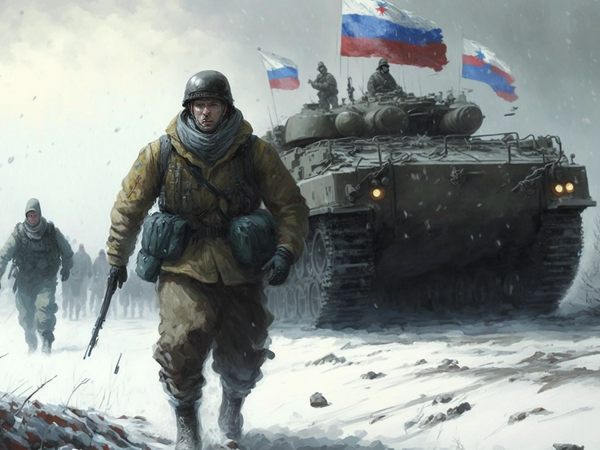Russia-Ukraine Conflict
Should the united states intervene in the Russia-Ukraine conflict? What is our role in the world?By Emiliano Garcia-López Attribution: Midjourney
Attribution: MidjourneyNote: this brief is outdated. It is currently our only outdated brief, and we plan to have a brief by the end of September.
Introduction
In recent weeks the Russian war in Ukraine has been at the center of everyone’s mind; it represents a radical shift in international politics and could turn out to be the proximate cause of the third world war. At the time of writing, this crisis has forced over 2,000,000 Ukrainians to flee the country, leading to the loss of thousands of lives.
Compelled following this act of aggression, millions of citizens worldwide have come to support measures such as cutting Russia off from the SWIFT financial system and instituting a ban on their natural gas. The current difficulty becomes drawing a line between necessary actions and ones extreme enough to cause WWIII. For example, there is significant controversy about whether we send American troops to Ukraine, establish a no-fly zone, and/or send over fighter jets.
Pro Intervention
Almost all Americans view Putin’s incursion into Ukraine as morally unjustifiable, but to different extents. Those on the Pro-Intervention side believe that we have a moral obligation, as a global superpower, to support the people of Ukraine in their fight for freedom. They believe that apart from providing humanitarian aid to the citizens of Ukraine, we should bolster Ukraine’s military by sending them advanced surface-to-air weaponry, including MiG fighter jets. Those who are pro-intervention generally support all forms of economic sanctions on Russia, and a few have called for even stricter measures such as canceling the visas of Russian citizens in the United States.
Pro-intervention Americans also support the establishment of a no-fly zone—a measure that Ukraine’s president Volodymyr Zelensky asked for; it would establish American air superiority over Ukraine and would mean that Russia could not prosecute this war using airstrikes. An even stronger position within the pro-intervention camp states that the United States should support Ukraine’s admission into NATO, hence backing Ukraine with the full might of the U.S. military. Ultimately, most proponents of U.S. intervention believe that the longer we wait, the worse it’ll get and that we can’t have the threats of a dictator prevent us from acting our conscience.
Against Intervention
While the Russian war in Ukraine represents nothing less than a humanitarian crisis, many are concerned that if the United States were to intervene in the conflict seriously, we would be running the risk of nuclear war. They point to President Putin’s direct nuclear threats, as well as his order to put the Russian nuclear arsenal under high alert—essentially priming the Russian military to enact a nuclear strike. Opponents of U.S. intervention also consider that, while Ukrainians might be suffering in this war, a U.S. Intervention would only lead to the loss of American lives, as well as a higher overall death toll. They argue that, as unfortunate as it sounds, the best resolution to this conflict would be a peace agreement between Ukraine and Russia—one which would likely involve Ukraine’s acceptance of Crimea as a Russian state, the separation of Donetsk and Luhansk, and a constitutional amendment by Ukraine that would guarantee it doesn’t join NATO or the E.U. Furthermore, some who are against U.S. intervention believe that economic sanctions, such as the banning of Russian gas, won’t actually help the Ukrainians in any meaningful way but would only work to the detriment of the U.S. economy. For example, gas prices have soared to unforeseen heights, and inflation is likely. Those against intervention believe it to be a motion that would cause more problems than it fixes and that peace would have a greater net benefit.
Discussion Questions
- Should the United States maintain its ban on Russian gas as prices increase?
- How much of our economy should we jeopardize as a means of disabling Russia?
- What steps should the U.S. take to fill the void of Russian gas?
- Should we continue to rely on Saudi Arabian gas, or would this represent a sort of moral hypocrisy by ignoring the Yemen crisis?
- Should we make concessions to Venezuela in exchange for their oil imports?
- Should we invest in alternative energy sources like nuclear, solar, wind, etc.?
- Should the United States send weaponry to Ukraine? What type of weaponry?
- Anti-tank missiles and surface-to-air systems?
- Fighter Jets?
- Should we send American troops to fight in Ukraine? If not now, what would need to happen to warrant a direct American Intervention?
- What should America’s role on the world stage be? Should we intervene for the sake of humanitarian values or pursue a more isolationist policy?
Sources
Bibliography Kirby, Jen. “The Dangerous New Phase of Russia’s War in Ukraine, Explained.” Vox, March 12, 2022. https://www.vox.com/22970918/russia-war-in-ukraine-explained.The
Independent. “Russia-Ukraine War: Key Things to Know about the Conflict.” The Independent, March 13, 2022. https://www.independent.co.uk/news/ukraine-russia-moscow-kyiv-joe-biden-b2034723.html.The
Washington Post. “Russia-Ukraine Live Updates: Russian Strike on Military Site near Poland Kills at Least 35, Injures 134.” Washington Post, March 13, 2022. https://www.washingtonpost.com/world/2022/03/13/russia-ukraine-war-news-live-updates/.
The Associated Press. “Average US Gas Price Rises 22% in Two Weeks to Record $4.43.” ABC News. ABC News Network, March 13, 2022. https://abcnews.go.com/Business/wireStory/average-us-gas-price-rises-22-weeks-record-83423026.